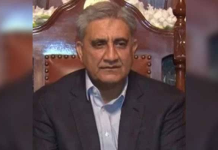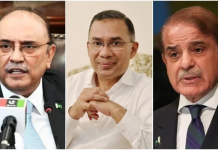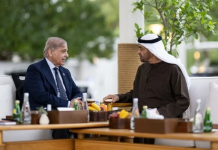Uzbek ambassador says not only Punjab, but KPK is also well connected with Uzbekistan
Bureau Report
LAHORE: On 12th October 2021, a Roundtable Discussion on “Central-South Asia Regional Connectivity: Grand Initiative by President ShavkatMirziyoyev” was organized by Center for Global & Strategic Studies, Islamabad & Department of History & Pakistan Studies, University of the Punjab in collaboration with Embassy of the Republic of Uzbekistan, Islamabad & Regional Integration Center, University of the Punjab, Lahore at University of the Punjab, Lahore.
The roundtable discussion aimed to highlight the importance of regional connectivity between Central and South Asia vis-à-vis socio-economic and cultural cooperation. The event commenced with the opening remarks of Prof. Dr. Muhammad Saleem Mazhar, Pro Vice-Chancellor, University of the Punjab, Lahore. He stated that Punjab University is one the oldest university and the Department of History has created many scholars and professors. Punjab University has offered admissions to the students of Uzbekistan that will prove to be a milestone in Pak-Uzbek bilateral ties.
Brigadier Mansoor Saeed Sheikh SI (M) (Retd), Vice President (Punjab Region), Center for Global & Strategic Studies (CGSS), Islamabadin his welcome address stated that Pakistan is situated at the convergence of three geo-economically significant regions and it offers shortest route to the sea for all landlocked countries of Central Asia alongside western China and Afghanistan. Pakistan stands out significantly in this regional connectivity. He also stated that at present, the initiative of Central-South Asian connectivity by President of Uzbekistan has emerged as a significant factor in rejuvenating centuries old traditional and cultural linkages between both countries.
Chief Guest of the event, Aybek Arif Usmanov, Ambassador of the Republic of Uzbekistan to Pakistan presented Key note speech on“Pakistan and Uzbekistan economic cooperation and perspective”. He stated that not only Punjab, but KPK is also well connected with Uzbekistan. President Shavkat Mirziyoyev and Prime Minister Imran Khan are the first drivers and promoters of connectivity. The projects of connectivity between our countries are already showing positive impacts as I see young researchers, students and scholars gathered here for this event. For more than three years, Pak-Uzbek leaders are working for the peace and development in Afghanistan. He stated that all countries are interested to use Pakistan as a transit hub in Central Asia. He also stated that we are now working on high technology cooperation with Pakistan. Experts from Uzbekistan helped in formulating solutions to enhance cotton production in Pakistan.
Mr. Khalid Taimur Akram, Executive Director, Center for Global & Strategic Studies (CGSS), Islamabadgave a detailed presentation on “Analyzing the concept of Central- South Asian Connectivity: Ten-point agenda by Shavkat Mirziyoyev”. He stated that Central and South Asia, located at the crossroads of the Great Silk Road, have promoted active dialogue between peoples and civilizations for many centuries. The peoples of our regions have repeatedly found themselves within the framework of common state formations, as well as a common political, economic and humanitarian space. The close ties between our people have contributed to rapid intellectual and spiritual progress. Mr. Khalid Taimur also discussed the 10 Point Proposal by Shavkat Mirziyoyev, President of the Republic of Uzbekistan.
Prof. Dr. Mahboob Hussain, Chairman, Department of History & Pakistan Studies, University of the Punjab, Lahore presented speech on “Historical & Cultural linkages between Central-South Asia: An overview of great civilizational patterns”. He stated that common cultural heritage needs to be explored and academic exchange and collaboration is the need of the hour. The most recent initiative was taken by the President of Uzbekistan, His Excellency Shavkat Mirziyoyev by organizing an International Conference on Central-South Asia Connectivity. Connectivity is not just about economics, it also drives regional cooperation and encourages friendly relations among neighbors. Our University is ready to establish links and active participation with all the regional countries.
Prof. Dr. Iram Khalid, Chairperson, Department of Political Science & International Relations, University of the Punjab, Lahore presented speech on “Reinvigorating the phenomena of academic cooperation into regionalism: A case study of Central & South Asia”. She presented a model that included activities like student exchange programs, seminars, conferences and expert exchange programs. She stated that for the growth of ideas, we need to incorporate academicians from social sciences. Moreover, a committee should be made for curriculum building specifically for this region and in the longer term, a university must also be established dedicated to the Central-South Asian studies.
Prof. Dr. Rukhsana Iftikhar, Department of History, University of the Punjab,Lahore presented speech on “Economic Potential Between Central and South Asia”. She stated that since the freedom of South Asian states, Pakistan has also been trying to promote her relations with these newlyborn and rich resources states. Pakistan has been a gateway to Central Asia since centuries. Central Asia holds significance for the land and people of Pakistan. Pakistan can be one of the finest partners for Central Asia in terms of economic cooperation.
Dr. Fozia Ali Hadi, Director, Regional Integration Center (RIC), University of the Punjabpresented speech on “Role of SCO in Central & South Asia Connectivity”. She stated that SCO Member states stand for promoting cooperation in the development of international relations built upon mutual respect, equality and mutually beneficial cooperation as well as developing a common vision of a community of common destiny for mankind. The role of SCO is critical in adopting programs to promote socioeconomic development as this may be the key to merge as an effective tool for gaining stability and prosperity in the region.
Mr. Ghazi Muhammad Abdullah, Assistant Professor, Department of History & Pakistan Studies, University of the Punjabpresented speech on “Enhancing industrial cooperation between Pakistan and Central Asia: Options and parameters”. He discussed the current challenges in the way of development including the changing dynamics of Afghanistan, border tensions in the region and other pertinent issues.He also discussed that our leaders and academia are actively engaged and they should also analyze the challenges and work towards their resolve.
Mr. Jasur Saidahmedov, Second Secretary, Trade and Economy, Embassy of the Republic of Uzbekistan, Islamabad highlighted Pakistan and Uzbekistan cooperation with relevance to significant cultural and tourism ties. He discussed in detail the prospects of agricultural cooperation between Uzbekistan and Pakistan that will enhance the bilateral relations between both brotherly countries. He stated that Uzbekistan is eating Pakistani potato. In every village, every city there are Pakistani potatoes.Furthermore, he stated that the athletes from Pakistan are participating in various competitions of Uzbekistan and recently a wrestler from Pakistan has won a gold medal in that competition. Similarly, various other initiatives are being undertaken to enhance cooperation and people to people contacts. He stated that tourism has become important between our countries. We have a Pak-Uzbek culture and trade center and tourists information centers as well.

















